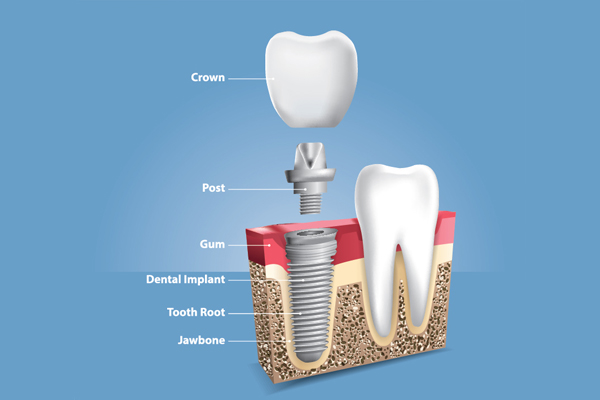 Implant dentistry is growing in popularity. It is a restorative option for a single missing tooth, a section of missing teeth, or an entire row. This review discusses the implant dentistry procedure and when a dentist might recommend a dental crown attachment to complete the implant restoration.
Implant dentistry is growing in popularity. It is a restorative option for a single missing tooth, a section of missing teeth, or an entire row. This review discusses the implant dentistry procedure and when a dentist might recommend a dental crown attachment to complete the implant restoration.
Implant dentistry: Everything to know about implant-supported crowns
To make the most informed decision possible regarding implant dentistry and teeth replacement, it is important to understand all of your options. For example, if you are only missing one tooth and are interested in implant dentistry, then an implant-supported crown is likely the recommended solution for you.
Implant dentistry crowns defined
Implant dentistry crowns are used to replace a single missing tooth. They involve the placement of a dental implant, followed by the attachment of the abutment and dental crown on a follow-up procedure. The dental implant is a screw-like post made of titanium.
The implant is fixed into the jaw and must go through osseointegration, during which it fuses together with the jawbone to become one essentially. After this occurs, the abutment, which connects the crown and the dental implant is attached. Then, the crown is placed on the same procedure. The dental crown is typically made of a strong ceramic material that looks the same as a natural tooth.
Implant dentistry crowns vs. other dental implant options
The two other common types of implant dentistry options are implant-supported bridges and implant-supported dentures. They are both used for replacing multiple teeth (either a section of missing teeth or an entire row), whereas implant-supported crowns are used to replace a single missing tooth.
Only one implant is needed for implant-supported crowns, and multiple crowns (two to five) are needed for an implant-supported bridge or an implant-supported denture. Most dentists consider implant dentistry to be of a higher quality than non-implant restorations such as fixed bridges or removable dentures.
How to determine if implant crowns are right for you
Implant crowns are ideal for replacing a single tooth. When compared with restorations such as a fixed bridge or a partial removable denture, which are not supported by dental implants, an implant crown offers unique benefits such as preserving jawbone density. Implant crowns also last longer on average and are more damage-resistant.
How can I care for my implant crown?
Another benefit of implant-supported crowns is that they are easy to take care of daily. With regular cleaning visits with the dentist, consistent oral hygiene practices, and reducing the risk of dental trauma, dental crowns can last for more than twenty years in many cases.
Get in touch with us today to schedule an implant dentistry consultation
Everyone should be able to show off a great smile and not have to feel insecure or have a harder time functioning due to one or more missing teeth. If you are interested in finding out more about implant dentistry and the benefits it can provide, then call us today to schedule a consultation.
Request an appointment or call Modern Smiles Family Dentistry at 602-362-7065 for an appointment in our Phoenix office.
Related Posts
There are several options available to patients after losing a tooth. One of the more popular options -- and perhaps the longest-lasting solution – is implant dentistry. This involves the placement of one or more dental implants, followed by the attachment of abutments and a crown, bridge, or denture.Depending on the number of teeth that…
Implant dentistry uses dental implants to serve as the support for replacement teeth. The process involves a minor surgical procedure to place the implants. Although the risks are minimal, it can take some time for the mouth to fully heal and for the dental implants to fuse together with the jawbone after the implant dentistry…
Implant dentistry involves the replacement of natural teeth after tooth loss occurs using titanium posts (known as dental implants) and the attachment of a restoration, such as a dental crown, dental bridge, or denture. A bone graft is often necessary before an implant dentistry procedure, particularly when there is not enough healthy bone inside the…
